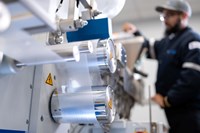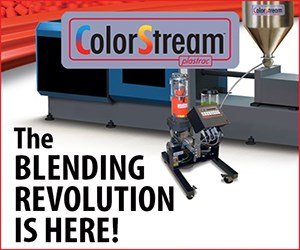APPLICATION: Styrenic TPEs Outperform TPVs in Medical-Device Cable Assemblies
Minnesota Wire of St.
Minnesota Wire of St. Paul, Minn., is producing cable assemblies for medical devices such as defibrillators with new styrenic TPE compounds in place of the TPVs typically used. New Medalist MD-8421, MD-8431, and MD-8451 grades from Teknor Apex Co., Pawtucket, R.I., have Shore A hardness levels of 92, 69, and 82, respectively, and a continuous operating-temperature rating of 105 C. They were tested by Minnesota Wire and found to offer better tensile and elongation properties than TPVs before autoclaving and to retain more of these properties after multiple autoclave cycles—an important advantage in the many medical devices intended for reuse.
Says Minnesota Wire design engineer Jeff Lewison, “In addition, the Medalist compounds are more stable in extrusion, and in injection molding their improved processability means that we can lower the pressures to reduce the likelihood of defects when we’re molding over delicate circuitry. Customers will like the fact that our product just looks and feels better.” Moreover, he cites enhanced electrical properties of these compounds, noting that the company can produce cables with thinner walls, which allow for improved coiling and which allow their use in insulation as well as jacketing.
(401) 725-8000 • teknorapex.com
Related Content
-
Catheter Specialist Finds Sweet Spot Serving Small, Medium-Sized Concerns
Medical-component specialist LightningCath has carved a niche meeting the needs of small to medium-sized entrepreneurs with complex catheter designs … quickly.
-
Medical Manufacturer Innovates with Additive Manufacturing and Extrusion Technology Hubs
Spectrum Plastics Group offers customers two technology hubs — one for extrusion, the other for additive manufacturing — to help bring ground-breaking products to market faster.
-
Consistent Shots for Consistent Shots
An integral supplier in the effort to fast-track COVID-19 vaccine deployment, Retractable Technologies turned to Arburg and its PressurePilot technology to help deliver more than 500 million syringes during the pandemic.















